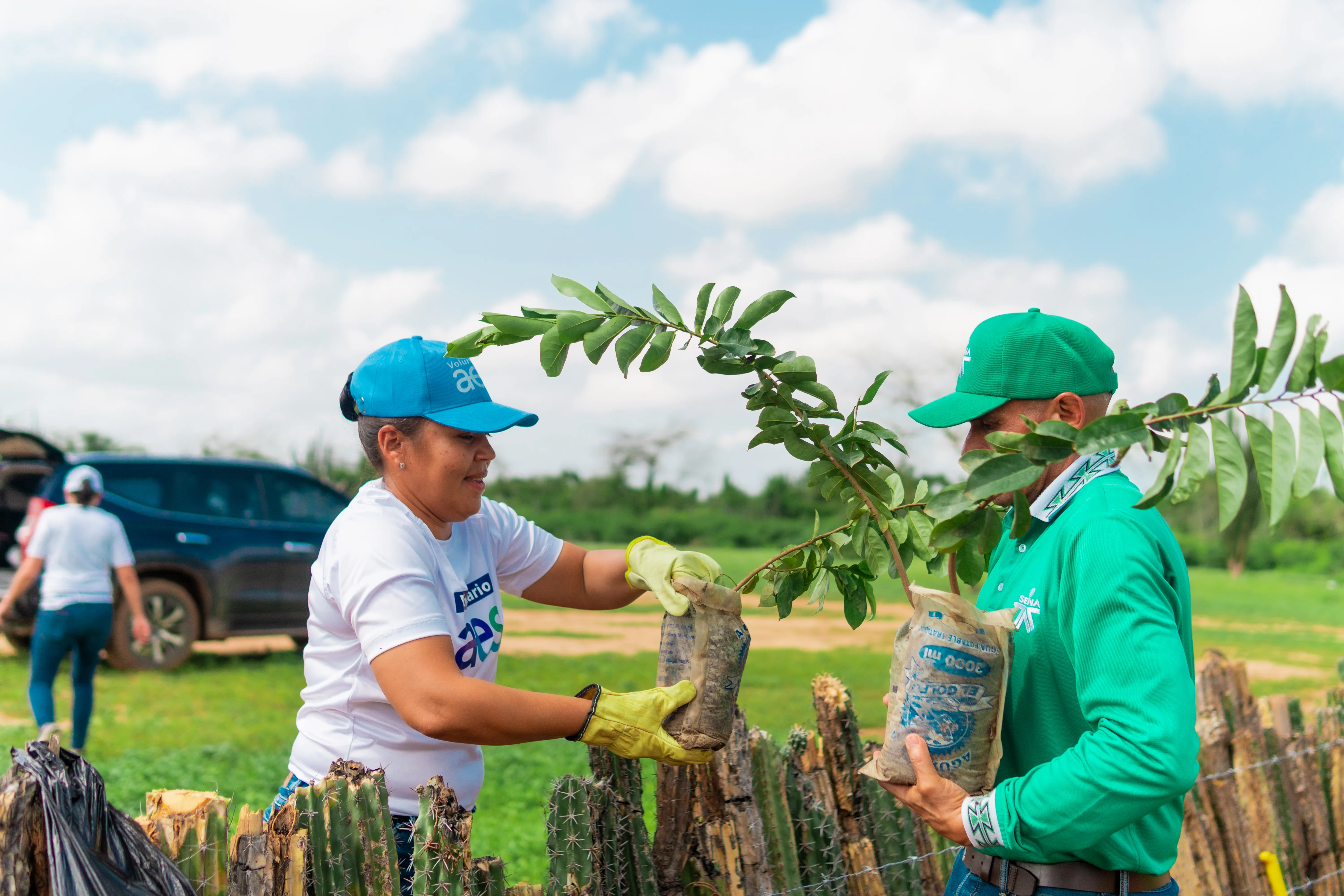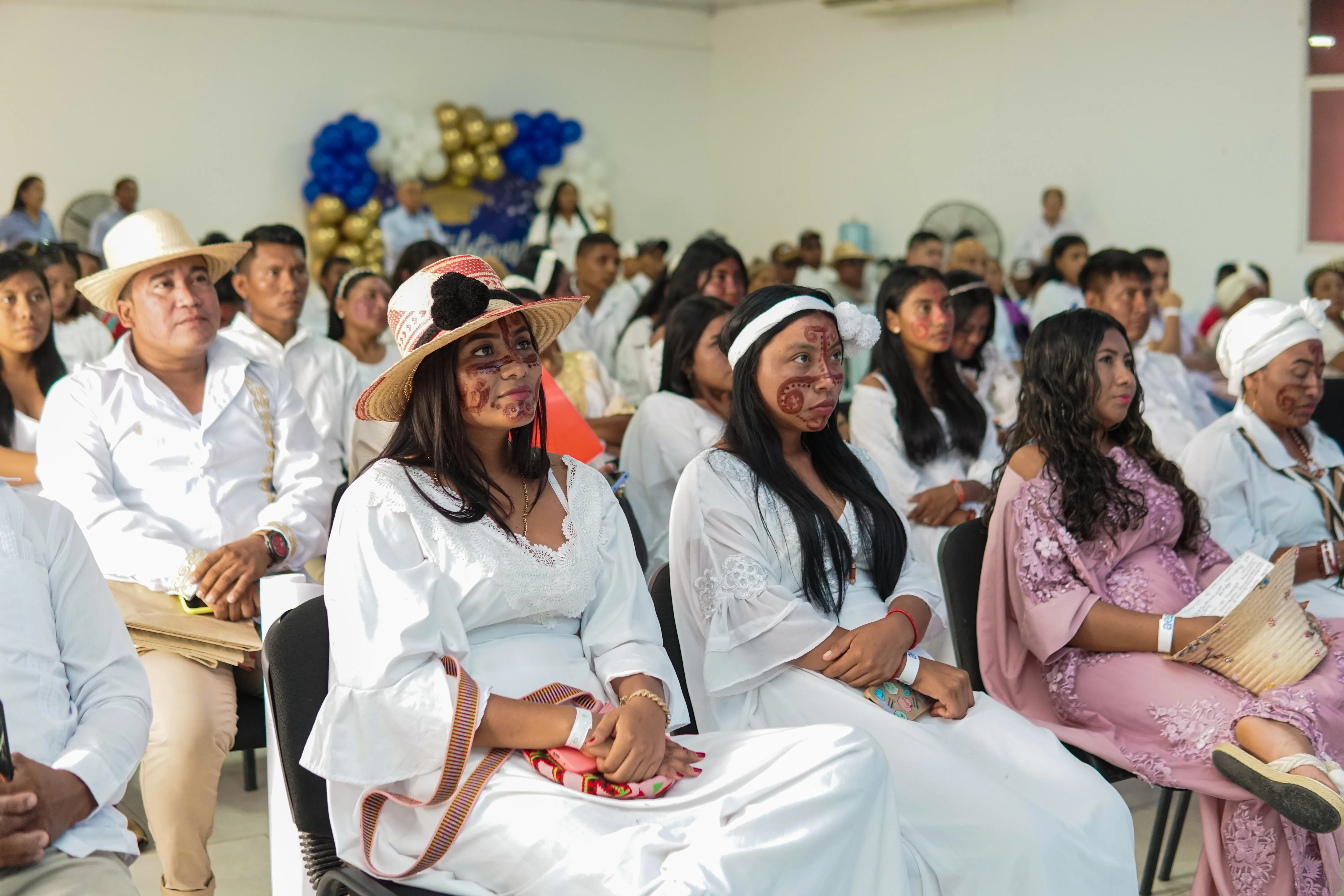Human Rights Management System
AES Colombia’s commitment
As part of our corporate responsibility, AES Colombia has a Human Rights (HR) Management System, in accordance with the United Nations Guiding Principles. In this way, we reaffirm our commitment to respecting the human rights of all individuals with whom we interact.
Components of the HR management system
- Human Rights Policy.
- Management Dashboard.
- Risk Matrix.
- Continuous Education.
- Program for Suppliers and Contractors.
- Reporting Channels.
AES Colombia Human Rights Policy
The Human Rights Policy establishes the guidelines and expectations for our conduct towards our stakeholders. This commitment extends to our employees, communities, suppliers, contractors, clients, government entities, and media. Read the complete AES Colombia Human Rights Policy.
Public commitment
Public commitment
AES Colombia reaffirms its responsibility to respect human rights through actions aimed at protecting the life, health, integrity, and well-being of people, avoiding negative consequences derived from its activities.
Normative references
The policy aligns with the UN Guiding Principles on Business and Human Rights and other international standards such as ISO 26000, the Global Reporting Initiative Standards, the United Nations Global Compact, and the Voluntary Principles on Security and Human Rights.
Scope and focus
The policy covers all AES Colombia's activities, including its operational and development assets, as well as those of our suppliers and contractors.
General Commitments
AES Colombia commits to:
- Respect and promote human rights without discrimination.
- Evaluate and manage the potential negative consequences of our activities.
- Respect beliefs, creeds, traditions, language, and cultural characteristics.
- Protect personal and confidential information.
- Maintain open and available communication channels.
Commitments and expectations with stakeholders
The policy details specific commitments and action expectations for each stakeholder group.
Commitments to Employees
- Provide fair and equitable opportunities and working conditions.
- Prevent, monitor, and investigate situations of discrimination or workplace harassment.
- Offer inclusive, safe, and healthy working conditions and environments.
- Ensure respect for freedom of association and collective bargaining.
Commitments to communities
- Establish social management strategies in accordance with community needs.
- Prevent, mitigate, correct, or compensate for social and environmental impacts.
- Comply with agreements reached in prior consultation processes.
- Facilitate mechanisms for assertive dialogue and communication.
Commitments to suppliers and contractors
- Ensure payment of contractual obligations within agreed terms.
- Ensure the comprehensive health and safety of workers.
- Monitor clauses established in contracts.
- Raise awareness and provide tools on human rights.
- Communicate any changes that may affect their operations.
Commitments to clients
- Understand client needs and offer comprehensive solutions.
- Comply with contractual commitments related to human rights management.
Commitments to government entities
- Comply with all applicable laws and regulations.
- Facilitate the investigation of complaints related to negative human rights impacts.
- Maintain permanent relationships and foster inter-institutional dialogue.
Commitments to media
- Provide relevant, transparent, timely, and truthful information.
- Maintain assertive dissemination and communication spaces.
Monitoring and responsibilities
Each area of AES Colombia is responsible for fulfilling the commitments established in the policy and for monitoring expectations with stakeholders. The policy includes a management dashboard with specific actions, goals, responsible parties, and monitoring indicators.
Dissemination and awareness
The policy is disseminated and socialized to all our stakeholders through communication strategies and awareness-raising activities to ensure knowledge and adherence to the established commitments and expectations.
Management dashboard
AES Colombia's HR Policy Management Dashboard details the company's commitments and expectations regarding human rights management. The management dashboard is designed to ensure compliance with these commitments and provide detailed monitoring of associated actions and goals. This tool was developed in conjunction with the leaders of each area and allowed us to identify key tasks that we regularly review in an internal due diligence process.
Human rights risk matrix
Through the matrix, we identify and analyze human rights risks in the areas of influence of our operations. The matrix includes specific recommendations and a monitoring instrument to effectively manage identified risks. The information contained in the matrix complies with all established steps for developing a human rights risk and impact assessment according to national and international standards, such as:
- Including communities in the area of interest in identifying both risks and impacts, and in developing management measures.
- Evaluating the probability and severity (magnitude) of risk and impact materialization, which depends on detailed knowledge of the environment and the company's capabilities to manage them.
Continuous education
Aiming for our employees and contractors to become experts and ambassadors in human rights, we provide training sessions and publish guidance materials that help strengthen knowledge in these areas.
Over the past years, we have implemented a training plan, developed through a theoretical-practical methodology, addressing real issues that occur in the operational territories of AES Colombia. Through playful tools, we seek to generate interaction among the different stakeholders to address and solve problems specific to each area. In these workshops, we incorporate a differential approach and conflict resolution to highlight the diversity present in each territory and to serve as an articulating axis for these actors to overcome barriers and resolve conflicts.
Participating Stakeholder Groups:
- Suppliers and contractors
- Community and local authorities
- Wayuu community
- Employees
Topics Developed:
- Fundamentals of human rights
- Human rights and business
- Human rights policy socialization
- Due diligence
- Human rights and decent work
- Knowledge of Wayuu culture
- Risks and actions regarding possible human rights violations
- Differential approaches
- Conflict resolution
Program for suppliers and contractors
Our suppliers and contractors are key to helping us respect human rights. Therefore, initially, (i) we support our recurring suppliers in designing their policies and processes for respecting human rights. Subsequently, (ii) we include (a) human rights respect criteria in our bidding processes, as well as (b) human rights respect clauses in their contracts and purchase orders. Finally, (iii) we design a self-assessment survey so that our contractors can share how they implement their human rights respect practices.
This program has enabled us to train and advance in the identification of risks and due diligence in human rights throughout the value chain. For several years, we have been training our recurring suppliers and contractors in strengthening governance, through the development of workshops focused on:
- Introduction to human rights
- How to implement sustainability and human rights
- Identification and evaluation of risks and action scenarios in human rights
- Definition of the roadmap and monitoring mechanisms
- Best practices in the supply chain
Reporting channels
The reporting channels allow early identification of possible alerts through the reception of requests, complaints, claims, suggestions, and violations of human rights related to our operations and service delivery.
- Exclusive for employees:
- Coexistence Committee
- Safety and Health at Work Committee (COPASST)
- Family Responsible Company Committee (efr) — contactoefr@aes.com
- General stakeholders:
- Web: Online PQRS tool located on the website in the “Active Transparency” section: https://www.aescol.com/es/pqrs
AES Helpline (ethics and values): https://aeshelpline.com/
Emails:
- Web: Online PQRS tool located on the website in the “Active Transparency” section: https://www.aescol.com/es/pqrs
- Telephone:
- PBX: 601 407-9555
- Social management Valle de Tenza, Meta and Huila: 321 926 6941
- Social management La Guajira: 313 488 6985
- Emergency line for MNR clients: 018000423822 – (602) 2834066
- In-person:
- Bogotá: Av. Calle 100 No. 19-54 Offices 901
- Santa María: Santa María – Boyacá
- Jemeiwaa Kai Uribia Office: Carrera 14 calle 14-55 Eduardo Abuchaibe
Human Rights Due Diligence
Risk identification
In order to identify, prevent, mitigate, and respond to the negative consequences of our operations on human rights and in accordance with the United Nations Guiding Principles, in 2024, with the support of an external consultant, we carried out a human rights due diligence process in all AES Colombia's operational areas, considering the following aspects and technical sheet:
- Environmental conditions that put communities in the area of influence at risk of vulnerability.
- Environmental conditions that generate risks for the company, personnel, and assets.
- Potential risks and impacts with human rights consequences inherent to the sector and the environment. To conduct consultations in the field, four interview formats were designed, tailored to the selected stakeholder groups with particular variations in ethnic focus and the role of local authorities.
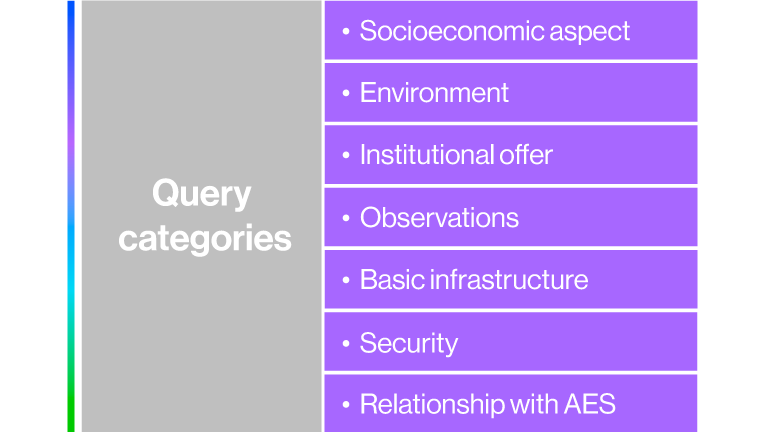
Risk description
The risks identified through the due diligence process were incorporated into the matrix with detailed information, including: associated rights, environmental conditions affecting the risk, affected stakeholders (right-holders), location of risk occurrence, severity in human rights, and consequences of the risk for AES Colombia's operation. The identified risks are at low and medium levels concerning both human rights severity and consequences for AES Colombia's operation.
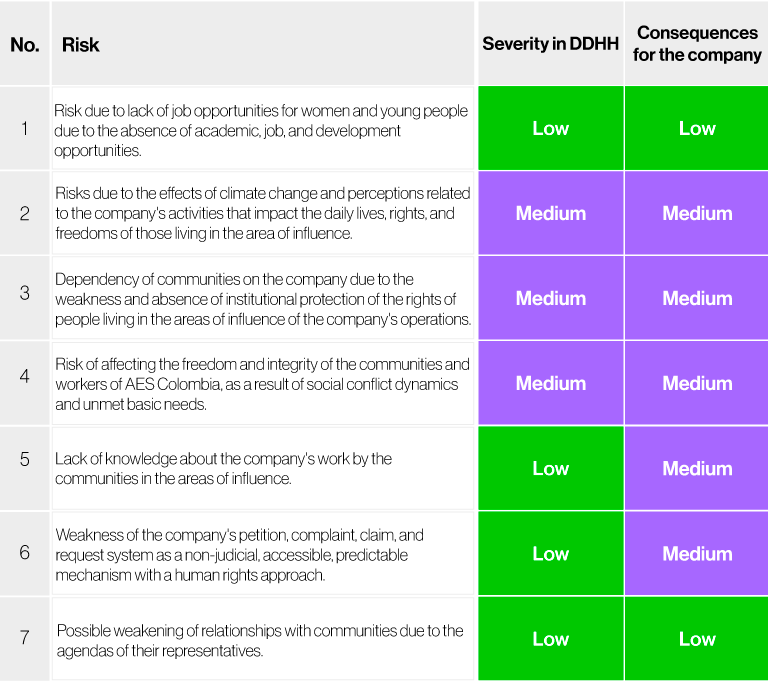
Mitigation actions
At AES Colombia, we have been carrying out various activities that have allowed us to unify the human rights risk matrix. A fundamental part of understanding these risks is being able to prevent or address them; therefore, the management plans for these risks become highly relevant. The management plans are included in the company's policies, are constantly reviewed, and have been divided into four categories:
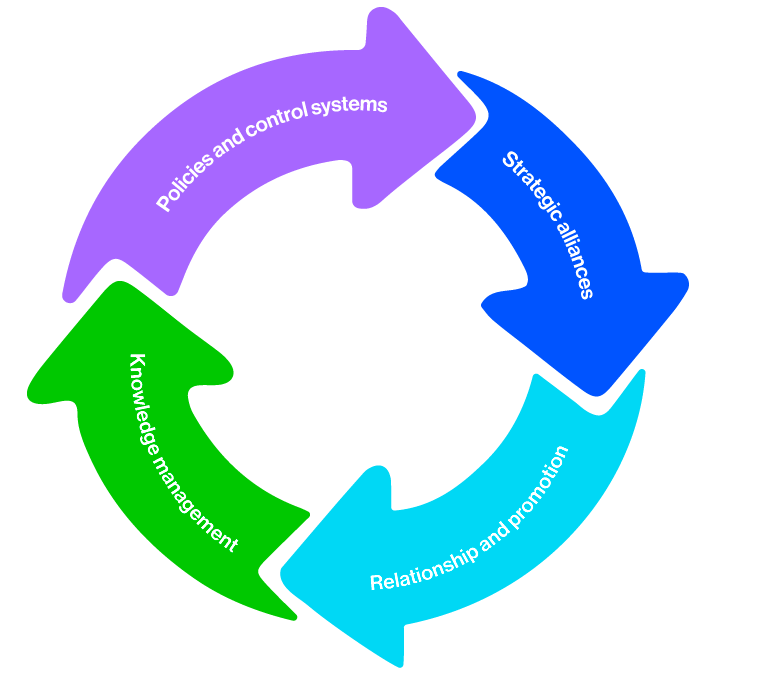
Monitoring and evaluation of risks
With the purpose of continuously tracking the actions established in the management plan, AES Colombia has implemented a monitoring tool that defines the following elements, which, through objective evidence, enables the collection of data to measure variables and indicators during the monitoring process:
- Maintain control over the actions carried out transversally and with the participation of the different areas of the company.
- Respond to specific situations.
- Make decisions.
- Deploy resources to mitigate risks based on evidence.
- Ensure that the company is carrying out actions aimed at mitigating risks, as established in an action plan.
Supply Chain Due Diligence
The United Nations Guiding Principles on Business and Human Rights establish that companies are responsible for their own management and for the management of suppliers and contractors who carry out activities within the territory. Therefore, AES Colombia applies a Human Rights Self-Assessment to its supply chain, with the purpose of identifying alerts for possible human rights impacts by suppliers and contractors and jointly developing prevention strategies and implementing action plans such as capacity building, accompaniment, monitoring, and collaboration with external actors, among others. The application of this tool ensures that all areas of the company participate in the process of strengthening due diligence in suppliers and, consequently, in the supply chain.
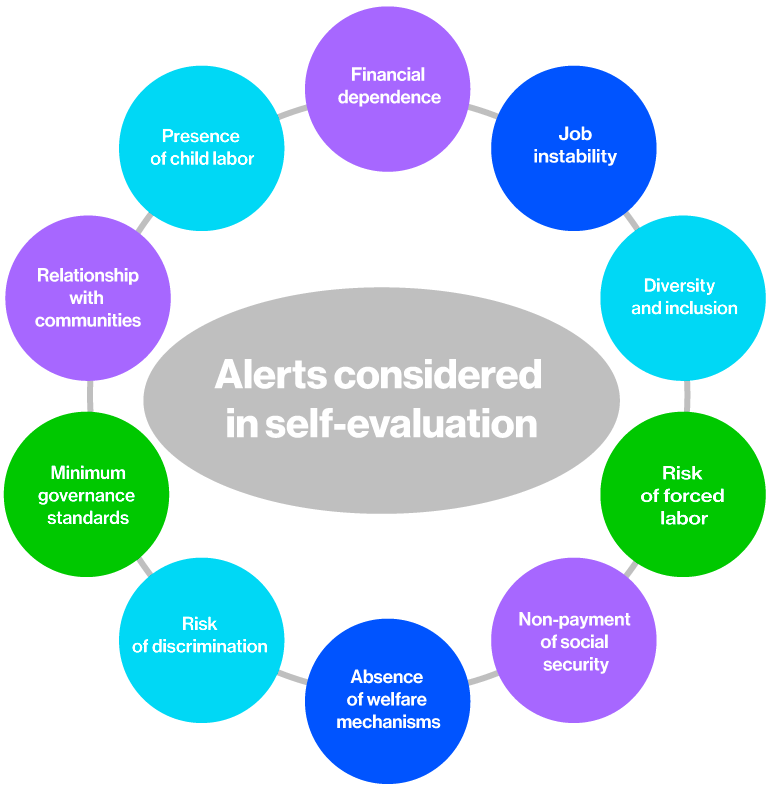
Complaint and Remediation Mechanisms
Reporting channels
For submitting requests, complaints, claims, suggestions, or information inquiries related to reports and allegations of possible irregularities, situations contrary to corporate values and ethics, regulatory violations, infringements of human rights, and environmental and/or social impacts related to operations and service delivery, AES Colombia’s stakeholders have access to the following channels:

Guide and definitions
Definitions
- Request: A respectful inquiry made by a stakeholder to the organization, either for general or specific reasons, seeking information, consultation, or support.
- Complaint: An expression of dissatisfaction arising from the behavior or actions of an employee or contractor during activities involving the Company, particularly those related to our values, code of conduct, and human rights policy.
- Claim: An expression of dissatisfaction from a stakeholder regarding non-compliance, irregularities, or potential impacts associated with the Company's services, management, or operations, including matters related to human rights.
- Suggestion: Advice, proposals, ideas, or recommendations for improvement, submitted by a stakeholder concerning the Company's services, management, or operations.
Guidelines
Please refer to the following documents for detailed procedures and submission of PQRS (Requests, Complaints, Claims, and Suggestions):
